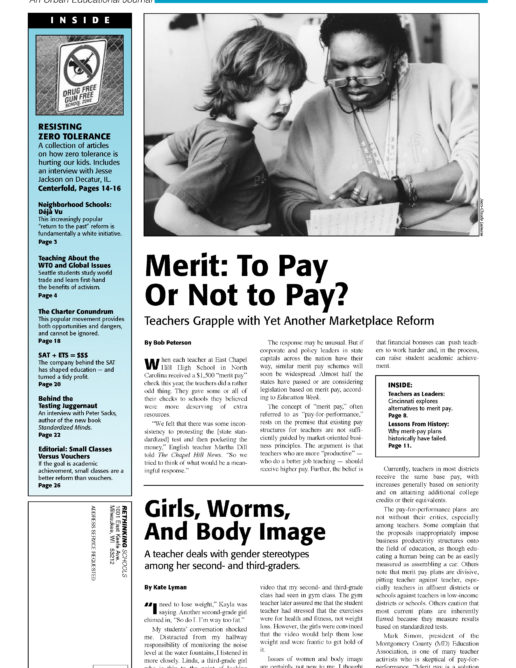Behind the Testing Juggernaut
The following is excerpted from a longer discussion with PeterSacks, author of Standardized Minds: The High Price of America’s Testing Culture and What We Can Do to Change It. Sacks was interviewed by Alan Stoskopf, associate program director of the Boston-based group, Facing History and Ourselves.
Q: Could you speak about the validity of these standardized tests and why test scores mean so much in our society?
There are some very powerful cultural forces that sustain this. We are a bottom-line society. We have a cultural tendency to believe that any kind of process, however complex, can be reduced to a single number or measure. The test scores are a prelude to a very powerful ideology of individualism and competition in American society. People want those individual scores. Parents want those scores.
You can talk about this until you are blue in your face. You can explain in detail, these are the problems with it. These are the technical reasons why that individual score is very problematic. Many people do not want to hear that.
For example, when I was doing a radio program in southern California, callers who were comfortable in their lives did not want to be told there were problems with the validity of these tests or that the meritocracy might be broken. They just don’t want to believe the evidence. They did not want to hear that the predictive validity of a test like the SAT is around 16% in its ability to predict freshman grades in college. The GRE is like 6%. They would rather have a severely flawed number than no number at all.
Q: What do you see the misuse of standardized tests doing to education today?
The accountability, high-stakes test movement has created a carrot and stick mentality in our schools. The analogy of privatized managed healthcare holds here. There are financial incentives for doctors to spend less time on actual patient care because of the system of rewards and punishments they are working within. With managed care, HMOs stopped trusting physicians to make medical decisions for patients. To hold the bottom line, managed care turned increasingly to technicians and accountants to make medical judgments.
The same is true in public education. Elected officials are eviscerating professional educators of their responsibility to make educational decisions. Bureaucrats are increasingly making those decisions. Education departments are bribing teachers to raise test scores to meet performance objectives. Teacher salaries or jobs are on the line. Just as doctors may change their behavior in the HMO model, say by withholding unprofitable patient care, teachers in the high-stakes accountability model will often teach to the test. This then transforms the very essence of what it means to be educated. Prepping for tests rewards certain limited kinds of thinking and penalizes deeper and more sustained reflection.
Also, public education is poised to become privatized, and this is being driven by the largely unquestioned assumption that test scores and school quality are the same thing. Private investors are poised to exploit that public perception. Test results and report cards are becoming a key “market” signal that potential investors will rely on, almost exclusively. Investment will flow to those “enterprises” that yield the best test scores. Sadly, such a model will completely disregard what exactly goes on in the classroom in terms of a healthy learning environment. This becomes a very dangerous situation for public education.
When test scores become the sole measure of school quality and individual achievement, that transforms the very essence of what it means to be an educated person in our society. Public education should be about creating opportunities for all students to achieve and participate in a democratic society.
Instead, much of the business community has come to view public education as its exclusive tool for producing a workforce. You will frequently hear business leaders tell state legislatures something like, “We are the customers of your products.” Is that why we go to school, to become products for American business?
Q: How would you respond to critics of alternative assessments who claim they are not valid instruments for evaluating large numbers of students?
In the first place, the evidence I’ve seen is that performance assessments can be very reliable, that is, yield highly consistent scores between assessments and even scorers. I think it’s yet another myth that only a multiple-choice standardized test can be reliable. There are well-developed techniques to ensure that performance assessments can be scored with a high reliability. We should use the various kinds of assessment tools for what each does best. If you want to know how students are REALLY doing in school, you enable them to write, speak, demonstrate, or complete a real-world project in which they can use their math, language, and science lessons as tools for a meaningful end. And you develop careful scoring systems to assess them.
If you’re interested in broader, geographic profiles of achievement, then a standardized test may be useful. But you don’t need to test every kid every year to gather that type of information. Whatever the kind of test, testing should be informative, and not punitive, and that means de-fanging the current accountability systems. Even the best assessments can become politicized and rendered educationally dubious once they are shoved into the same high-stakes box.
Q: Could you talk about where you see the “hope” in turning around this testing juggernaut?
It’s a losing battle to say we shouldn’t have standards and we shouldn’t have accountability. I think the way to win the education battle is to win the political battle. Parents need to organize and go on the attack to win the political battle. They need to say that high-stakes standardized testing is a recipe for mediocrity. It is okay to say we want high standards, but we need high-quality assessments.
![]()
![]()

